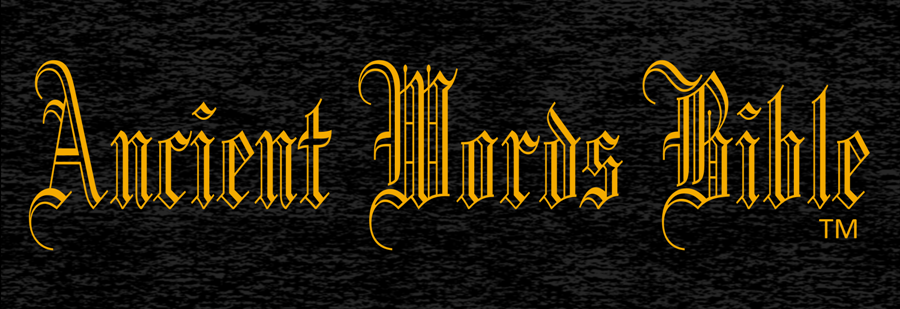Ancient Words Greek New Testament - first release of the Ancient Words Bible Suite by Memorial Crown Press.
The "Ancient Words Greek New Testament" provides a single merged text derived from both the Alexandrian and the Byzantine textual classics: Stephanus 1550, and, Nestle 1904. Over 4,000 textual variants between the two text-types are clearly documented, providing a one-source solution for understanding the Greek variants behind the translation of most classic and modern English New Testaments. |
| Order Now at Barnes and Noble |
The Alexandrian and Byzantine texts represented by Stephanus 1550 and Nestle 1904, where in agreement, form a common base-text for the "Ancient Words Greek New Testament."
Variants between the Alexandrian and Byzantine texts are presented in-line without bias using square brackets [Alexandrian] and parentheses (Byzantine). Thus, both text-types are honored without prejudice, allowing the reader equal and objective access to two of the most respected ancient Greek New Testament base-texts in one convenient document.
The variants among most modern English Bible translations are addressed in the Ancient Words Greek New Testament so the Greek reader can quickly identify and follow the source texts during live teachings or while listening to prerecorded audio.
Nestle 1904 and Stephanus 1550 represent two of the most respected and broad-based Greek source-texts underlying the English New Testament. The modern version of the Authorized King James Bible draws its New Testament portions primarily from Stephanus 1550. Stephanus standardized the chapter-and-verse numbering system used today and Stephanus IV was the chief base-text of the Geneva Bible, making the Stephanus texts the official New Testament Greek source of the Protestant Movement for more than 300 years. The Alexandrian text-type is represented by Eberhard Nestle's, The New Testament: Text with Critical Apparatus, published by The British And Foreign Bible Society.
Images of ancient papyri and parchments are displayed on the navigation page of each New Testament book. The digital images of these priceless treasures have been graphically enhanced to make the Greek text more legible, while balancing the highest quality with the needs of quick-loading mobile devices.
he readings adopted in the text are those in which at least two of these editions agree.
Ancient Words Greek New Testament incorporates the following simple In-line apparatus:
Most variants between the two texts have been identified using square brackets [ ] and parentheses ( ).
Minor variants such as spelling differences are generally not addressed. Examples: [Μωϋσεῖ] (Μωσῇ), [Ἡλείας] (Ἠλίας), [Δαυεὶδ](Δαβὶδ).
Common contractions have also not been noted as variants. Example: [Διὰ τί] (Διατί).
Square brackets [ ] indicate the enclosed variant is contained in Nestle 1904.
Curved brackets ( ) indicate the enclosed variant is contained in Stephanus 1550.
Example: Matt 1:19, Ἰωσὴφ δὲ ὁ ἀνὴρ αὐτῆς, δίκαιος ὢν καὶ μὴ θέλων αὐτὴν [δειγματίσαι] (παραδειγματίσαι), ἐβουλήθη λάθρᾳ ἀπολῦσαι αὐτήν.
Where only one type of bracket occurs in a verse, the bracketed word, or phrase, is contained only in the source indicated by the type of bracket used.
Example: Δαυεὶδ δὲ (ὁ βασιλεὺς) ἐγέννησεν τὸν Σολομῶνα ἐκ τῆς τοῦ Οὐρίου.
"ὁ βασιλεὺς" occurs in the above verse only in Stephanus 1550.
Asterisks * immediately inside of a bracket indicates that the text was included in the text of either, Nestle 1904 or Stephanus 1550, with reservations, or as a concession to popular demand for the inclusion of such verses. The asterisks are not meant to indicate any degree of judgment by the editors of the Ancient Words Greek New Testament.
Example: Luke 24:40, [*(καὶ τοῦτο εἰπὼν [ἔδειξεν] (ἐπέδειξεν) αὐτοῖς τὰς χεῖρας καὶ τοὺς πόδας.)*] This verse is contained in both source-texts with the variants indicated within the verse. However, the asterisk inside the square bracket indicates that verse 40 was presented in Nestle 1904 as a concession. Because no asterisk appears inside the parentheses, Stephanus 1550 accepts the validity of the verse.
Other ebook formats available at Smashwords: http://www.smashwords.com/books/view/552237

No comments:
Post a Comment